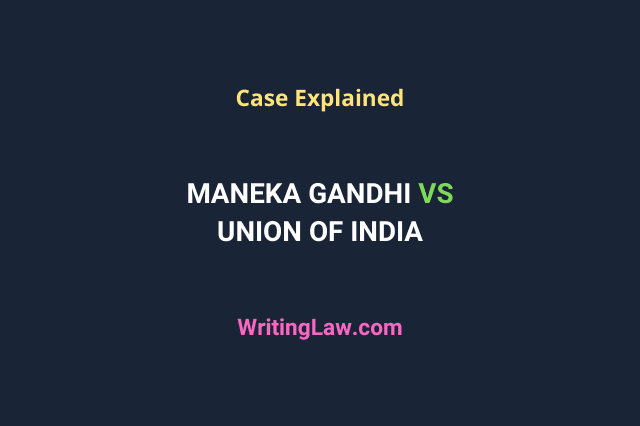
Maneka Gandhi vs Union of India
[1978 AIR 597]
Introduction
Maneka Gandhi vs Union of India case is regarded as the landmark judgment in the expansion of Article 21 and the interpretation of Fundamental Rights. Articles 14, 19 and 21 of the Indian Constitution were further strengthened after this case and gave new expansion to Article 21.
Before the Maneka Gandhi case, Article 21 only protected the Right to Life and Personal Liberty against the executive branch’s arbitrary actions, not from legislative action. However, this case also added protection against legislative activities.
In this law note, you will study the case summary of the Maneka Gandhi case and the judgement given by the 7-judge bench, along with its after-effects.
Background of Maneka Gandhi vs Union of India
After the imposition of emergency, Indira Gandhi’s image was tarnished, she lost the election of 1977, and the Bhartiya Janta Party was in power. During this time, her daughter-in-law, Maneka Gandhi, was running a magazine named Surya Magazine. She wanted to travel abroad regarding some democratic or human rights-related speech. While she wanted to travel, her passport was impounded (seized) by the passport authorities, and she was not allowed to fly abroad.
Facts of Maneka Gandhi vs Union of India
In 1977, the regional passport authorities asked Maneka Gandhi to surrender her passport and stated that this was necessary for the public interest.
Maneka Gandhi asked the reason for impounding her passport from the regional passport officer, and he did not give any valid reasons for the same.
Due to this reason, she filed a petition in the court under Article 32 of the Indian Constitution stating that her Articles 14, 19 and 21 were infringed.
Issues Raised in Maneka Gandhi vs Union of India
- Whether the right to travel abroad is included in the meaning of ‘personal liberty given under Article 21?
- Whether any procedure established by law decreasing personal liberty under Article 21 of the Indian Constitution is arbitrary?
- Whether section 10(3) of the Passport Act, 1967, violates Article 14 of the Indian Constitution.
- Whether it can be said that suspending Maneka Gandhi’s passport is against the principles of natural justice?
Judgement in Maneka Gandhi vs Union of India
A 7-judge bench was constituted in this case. Firstly, the Supreme Court said that the scope of personal liberty given under Article 21 of the Constitution of India is very wide. The right to travel abroad comes with the definition of personal liberty given under Article 21.
However, the court agreed that impounding the passport by the passport authorities under section 10(3) of the Passport Act is not unconstitutional because the passport authority has the power to grant suspension and cancel the passport, which can be important for national security.
But, here, in this case, Maneka Gandhi was not given an opportunity of being heard, and no valid reasons for impounding her passport were given to her by the passport authority.
The maxim of Audi Alteram Partem, which means let the other side be heard, was not followed in this case.
Moreover, the Supreme Court stated that Article 14 (Right to Equality), Article 19 (Right to Freedom) and Article 21 (Right to Life and Personal Liberty) form the Golden Triangle of the Constitution. At any time, if a law deprives a person of his personal liberty, it has to meet the criteria as specified in Article 14 and Article 19. Therefore, the passport authority can impound the passport of any citizen only after giving valid reasons for the same.
Effects of the Maneka Gandhi Judgement
After this judgement, the doctrine of ‘post decisional theory’ was evolved.
The court also ruled that the mere existence of law is not enough. Such a law should also be just, fair and reasonable. So, a liberal interpretation given by the court for Article 21 results in making “procedure established by law” along with “due process of law.”
“Procedure established by law” means that any law made by the legislature or any such body will be valid only if the correct procedure has been followed while making the law. “Due process of law” means that a government must protect and respect the legal rights of an individual.
Read Next:
- 14 Famous Cases Related to Article 21
- 48 Features of the Indian Constitution Taken From Other Countries
- Commercial Aviation & Travel Company vs Vimal Pannalal – Case Explained
- 13 Characteristics of a Company Under the Companies Act - 5th March 2024
- Lee vs Lee’s Air Farming Ltd – Case Explained - 5th March 2024
- Relevant Facts Under the Indian Evidence Act - 14th January 2024







